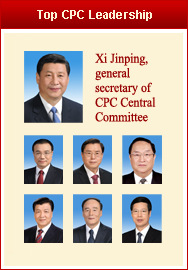What to watch in China's political reform?
(Xinhua)
Updated: 2012-11-11 14:01
Intra-party election
Political experts also noticed the emphasis on competitive election in Hu's report.
The report calls for efforts "to improve intra-Party election to create a procedure and conditions that fully represent the voters' will," the first time such wording to appear on the five-year CPC report.
It mentions the need to formulate competitive nomination and election into a system.
Since Deng Xiaoping's time, the Party leaders have been making intra-Party democracy a test ground to try out various democratic forms before they can be applied in the general public, said Wang, the Central Party School professor.
Intra-Party democracy is important because it concerns who will become the CPC leaders and how, political experts said. According to the CPC Constitution, all levels of the Party leadership, including the Political Bureau and its Standing Committee members, should be decided by election.
Both competitive and non-competitive - one-candidate-for-one-seat election - elections are legitimate forms in practice.
Though competitive election is mostly practiced at the grass-roots levels, there are signs in recent years that it is being expanded to upper levels of the Party hierarchy. "Competitive election has been used in a few provinces like Guangdong for top provincial Party officials this year," said Dai Yanjun, a Central Party School professor.
"It is an encouraging sign, because real election is competitive by nature."
For the current congress, the Central Committee will also be decided through competitive election, Cai Mingzhao, spokesman for the congress, announced earlier this week.
Experts pointed out that after competitive election was included in the report to the 17th CPC National Congress in 2007, the authorities ordered an expansion of competitive election in cadre selection process across the country.
The 18th CPC National Congress report clearly indicates further application of the election form, they said, though the timeline remains unclear.
Some people might tend to emphasize the defining moment for democracy but in reality you do need the maturity of the society, some basic preparations, said Li, the Brookings researcher.
"Democracy is a process, not an event," Li said. "There are people who see China's politics as a system that will never change, but in reality there are dynamic changes."
Related Stories
Election methods of CPC National Congress approved 2012-11-10 19:44
CPC National Congress gets world attention 2012-11-08 16:12
Key national congresses in CPC history 2012-11-07 11:13
How CPC National Congress delegates elected 2012-11-06 21:30
Makeup of delegates to 18th CPC National Congress 2012-11-06 20:49
CPC determined in political reform: official 2012-11-09 21:04
Communists walk fine line in reform 2012-11-09 19:57

Top News
Xi emphasizes adherence to CPC Congress spirit
Top legislator urges implementation of congress spirit
Moderately prosperous China brings chances to world
Video







